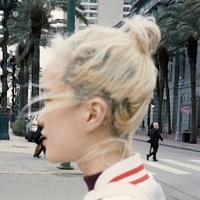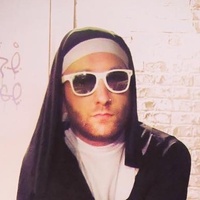On opening up your creative process
Prelude
Patrick Holland is a Canadian musician, producer, and DJ. His newest album, and first foray into guitar-driven indie pop, You’re The Boss was released on July 29th, 2022. He toured with TOPS in 2022, and makes up half of Jump Source with Priori.
Conversation
On opening up your creative process
Musician Patrick Holland discusses letting go of expectations, finding the right space to make things, and working with friends.
As told to Tiana Dueck, 2885 words.
Tags: Music, Process, Collaboration, Mental health.
What are your ideal surroundings for writing and composing?
I like starting early in the morning and opening up the window for good natural light. In my last studio, my studiomate Francis (Priori) and I were working from a windowless room with just a plant grow lamp for a light source. So, that was the atmosphere throughout writing my most recent album, You’re The Boss. Maybe the next record will feel different, now that we have a window. It’s much more comfy here.
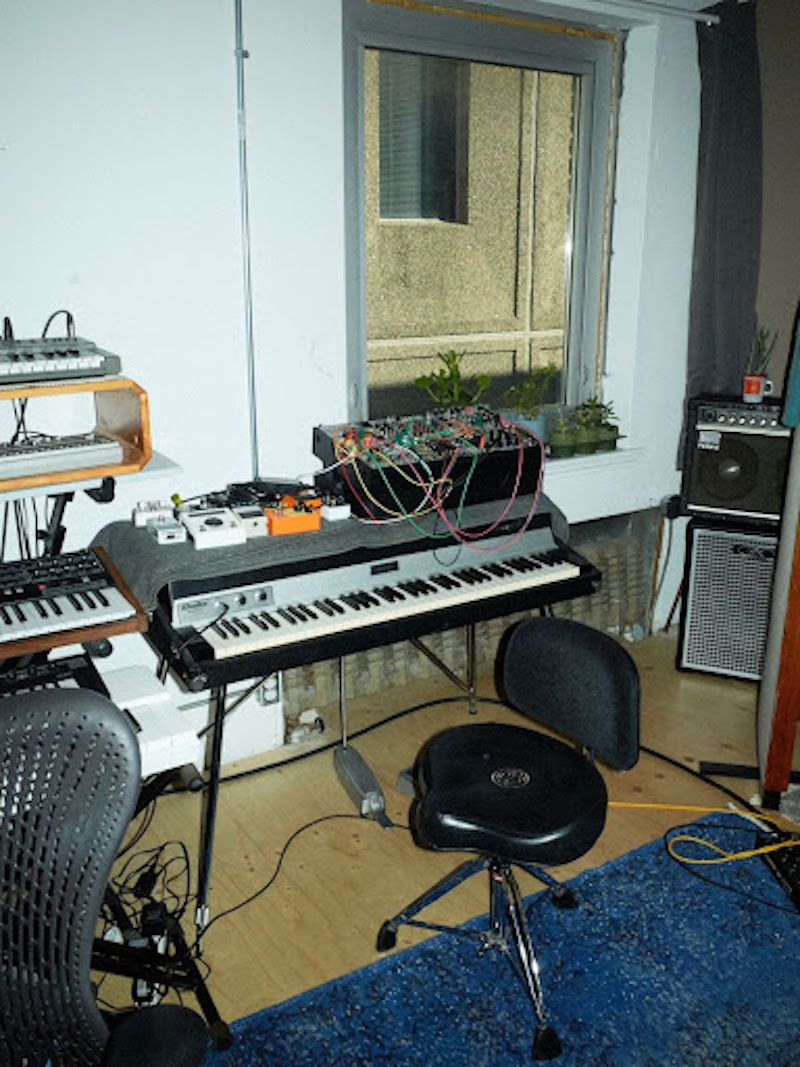
Just a block from the new studio lives my friend David, the guitar player for TOPS. Our close proximity was part of the reason why we started working together. We’re in a space right on top of a bar called Systeme, which has a lot of live music. It feels like the surrounding community is starting to feed into our studio life more. I don’t make music in a vacuum. Maybe sometimes I try to, but it inevitably fails. I feel a lot of influence from going to shows and mingling with the community there.
While you were building the new studio with Francis, what were some of your priorities?
Our old studio was basically a 12x12 foot box, which aren’t the best dimensions for sound. We wanted a bigger spot with better measurements for sound to travel, as well as room for visitors and instruments, like a drum kit. I prioritized making it a space where I could work with other people. I definitely wouldn’t have made You’re The Boss without help from friends, that’s for sure, so I’m glad to have more space for that now.
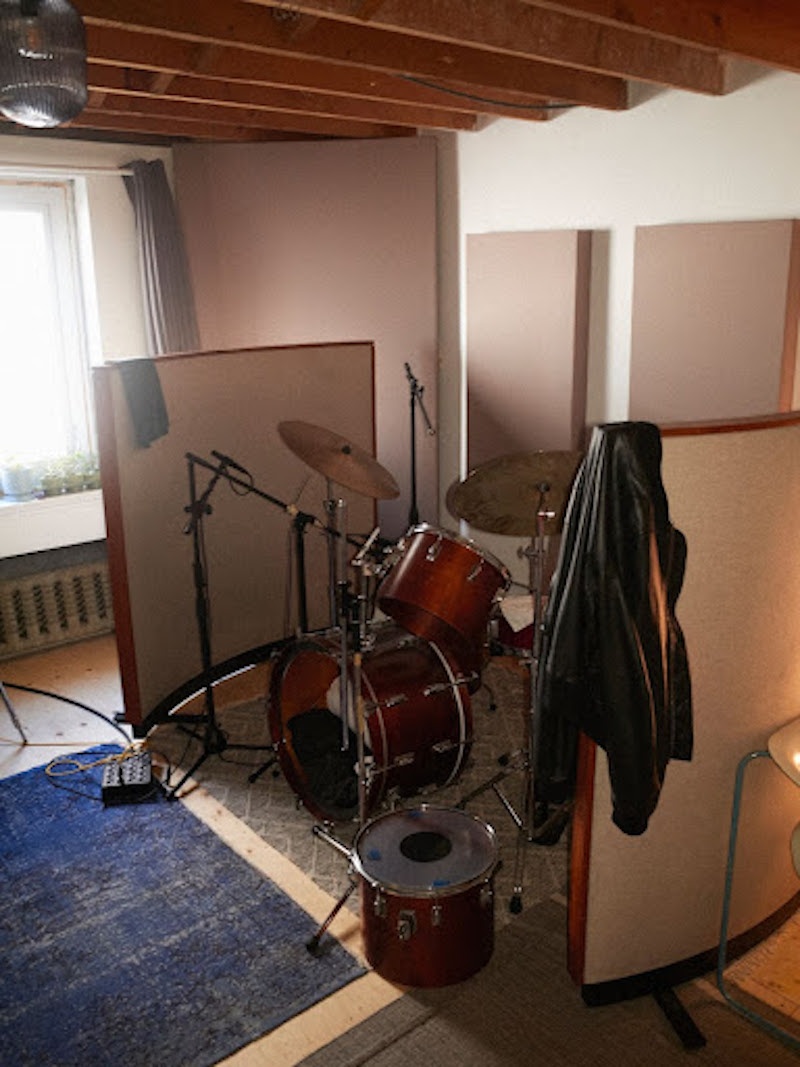
We got the whole thing soundproofed as much as we could. It makes the space really, really calming. With the window open you can hear the street—but being in a quiet room has been beneficial.
We hired Mark Littlefair, who has built a number of studios. We got very lucky that he was around. He was involved in building a popular studio here in Montreal called hotel2tango. He guided us through soundproofing within our budget. So, we have a raised floor, insulated double walls, and all that. Since it’s opened up I’ve done more writing with different groups of people. Having a space to bring other artists into is motivating.
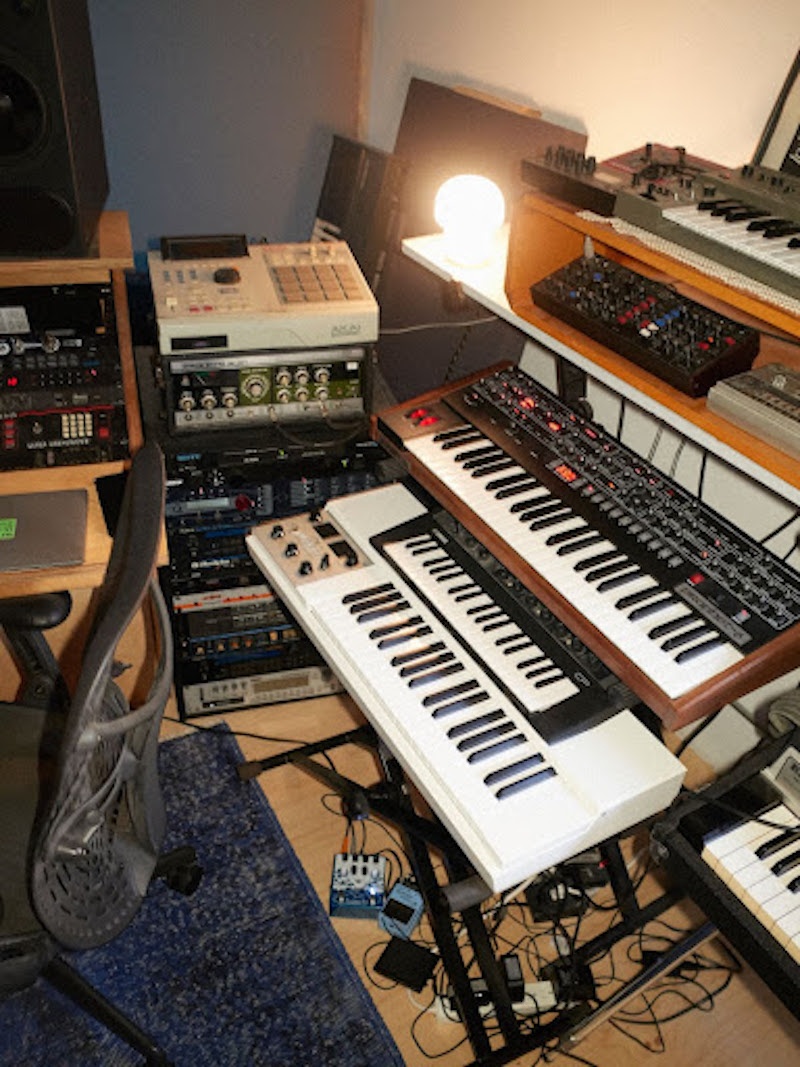
How do you go about finding those lasting connections that extend from friendship and into your music practice?
A big thing is to actually befriend people, simply because you want to be friends with them, not because you’re trying to get something from them. Those business relationships will happen naturally. It’s about putting yourself out there. I’ve sent so many cold emails and stuff like that in the past. I mean, I still do. And it’s really important to physically get out to shows and events, if you can, to meet as many nice people as possible.
How have you outsourced help on your projects over the years?
Older songs of mine like Sky Lounge (2015), Follow it Up (2015), and Beaubien Dream (2016) feature electric bass played by my pal Jeremy Dabrowski. I’d written the songs already, and he was nice enough to play those parts for me. I realized all you’ve gotta do is ask, and if your friend is inspired by the song, then they’ll jump on.
For You’re The Boss, Chris Edmondson was on the saxophone. I’d already written the melody on The Shame of it All, and it was easy for him to record that. But other flourishes he freestyled and I chopped up. He also wrote his own part for Sink to Dusk, and it completely blew me away—still does.
How do you adapt and your solo creative workflows when working collaboratively?
I try not to be too protective of ideas and things that come up. Just constantly moving. It’s a lot of “yes, and.” The more I collaborate with people in the studio, the more I try to keep that same mentality when I’m working alone. Sometimes when you’re working alone it’s as if you’re working with someone else and fighting against yourself, instead of just being open to changing up the mould. I think when you’re opening up, that’s when the good stuff happens.
It’s a great accomplishment to find that fluidity as an artist. What has been the most challenging part of making a living as a musician for you?
Learning to relax. It’s easy to feel like you either have all the time in the world or none when there’s no clocking in and out. My physical health dropped off a cliff from constantly touring from 2016-2020. I barely had any energy to do anything beyond playing gigs leading up to the pandemic. I’d improved at being healthier while on the road in 2019, but I was working against years of not paying attention. With all the time I’ve spent being at home, I know I simply need to travel less and be in the studio more. Some people can perpetually tour – I can’t, and am glad I found my tolerance level for it. If you need the break, take it. Luckily I was able to afford less time on the road, but that was purely at the cost of burning myself out.
You’re The Boss (2022) is your first indie pop release. What caused this switch from electronic dance?
You’re The Boss is the type of record I’ve wanted to make for a long time, but I didn’t have the tools or know-how to go about it. So, I was stuck to making music on my computer instead. I didn’t own guitars or anything like that. I would ask friends to help me out when it came to using guitars and whatnot.
When it comes to balancing dancy electronic sounds with organic instruments, there’s a fine line of corniness that can occur. You know, there’s gotta be some corniness in there. In the past I didn’t know how to guide that, but during my time producing You’re The Boss I really dove in. Balancing and contrasting light playful elements with dark earnest ones—whether it was through lyrics, melodies, or even production sounds and all that—was very fun.
When you talk about corniness, for me that word encapsulates a relationship between being sincerely playful and emotional. But what does it mean to you?
I feel similarly for sure. When I feel I’m being corny it’s usually because there’s a high level of sincerity or genuity going on that I feel uncomfortable with sharing, being too vulnerable. I try to lean into that discomfort, then morph and obscure it back to where I feel it sits well with me.
You’re The Boss has lyrics, which is new to you, and your listeners who know you for your dance music. What’s your approach to writing lyrics?
I’ve written in the past, but not lyrics. I always like writing in the Notes app. Day to day things, not necessarily diary style, just ideas and stuff. So, when it came time to write lyrics for You’re The Boss, I just dove through there and pulled things out. I was reflecting on ideas and things that I was feeling years before, and building off of that.
I mostly write in the studio. I really have to get in the zone. I’ll get myself into a lot of uncomfortable positions on my back — like all the weird poses you do when you’re on the phone. And I’m always switching from writing on my phone to the computer to paper, kind of trying it all in hopes that something will happen.
Do you usually like writing from your real life? Or is there a lot of fiction?
This last record was basically all drawn from my life, all true stuff, but pretty metaphorically delivered. What I wanted to do, yet what I didn’t end up doing, was writing more fictionally.
I’ve been trying more narrative based lyrics recently. More folky, not in the style of music, but in the lyricism for sure. It opens up a lot of doors and helps my brain expand to different vocabulary when I think fictionally. I find when I draw mostly from real life, I kind of think in the same vernacular that I might speak in. Which becomes narrower, to a certain extent. But when I’m reading a lot, fiction or not, it broadens my writing.
The funnest thing to do is to write a song all day, and then go out with friends later that night. It’s a very, very good feeling. So I’m going to try and do that a bunch over the next few months.
How were your usual creative processes impacted by exploring a new genre?
I definitely take quite a different approach to making music now than I did before You’re The Boss. In the past, with electronic music, it was the typical starting on the box or a machine with a beat or some idea for a sequence, and adding to that.
But with the new stuff, instead of that, I try to start with chords, a melody, or concept that’s away from the computer on some keys or guitar to get ideas rolling. Having lyrics inform the arrangement and rhythm of a song is a new thing for me too – there’s a lot more elements at play.
And now, I’ve continued to think in that same unique structural way when I’m producing anything, even electronic songs. It’s really flipped my whole process upside-down. I used to be a lot more production focused, but now I’ve been pushing myself to consider the writing first and get that all sorted before being too concerned with the end product.
Is there anything that holds you back in your creative processes?
Managing expectations tends to be the main thing to navigate. Nothing is going to turn out the way you expect it will. When diving deeper into an idea it’s hard to let go of the initial expectation you had for the end goal, whether that’s a specific sound, song, or piece of visual art. Getting over that hump and allowing yourself to completely change an idea mid-process is always a good move, and helps work against that stubborness of sticking to a concept. Similarly, nothing is going to land or be received by others the way you think it will. So managing the expectation for perceived success of a project is tough, but it’s best to let go of that sooner than later and not let it rot your brain.
For Jump Source, you’re collaborating with Francis; for You’re The Boss you’re touring with a band; when you DJ, you’re solo; and when you’re touring with other bands like TOPS, you’re playing for someone else’s project. What contrasts do you notice across all of these musical projects?
It’s nice how contrasting all of it is. I’m constantly expanding and doing new things. The type of touring I was doing before, with electronic music and DJing, all started to feel very similar and honestly got a bit boring. Now, the DJing projects I enjoy most are when I’m playing back to back with Francis. We hope to have a live show together one day.
In contrast, playing in my own band now, or another person’s band, makes things quite difficult because it’s pretty new to me. But the challenge is nice. I’m sure that playing with a band will gradually become a more comfortable experience.
How have the individuals you’ve collaborated with influenced your creative perspectives?
Anytime you collaborate with someone you get to see their unique creative process, which is so lucky. I’ve learned the most about making music when I’m collaborating with other people. For instance, when I started collaborating with Francis, I was also collaborating with Max McFarren (Complete Walkthru) a lot. We released a record called 2 Responsible in 2017. I was also collaborating with Khotin, at the same time. Witnessing all three of these people making music separately was so exciting, because they all go about it very differently. I’m sure I do it differently than them too; so, we all got to learn from each other in many different ways. It’s expanded so much since working on music with TOPS more recently as well. That’s definitely how I’ve learned all my best tricks.
You have a popular Spotify playlist Truly Nice Music, which shows a deep appreciation for many different textures of music from a wide array of genres. How does cataloguing a diverse rolodex of sounds influence you?
There was a point a couple years back that I only really listened to stuff I was interested in DJing. Which was still fairly diverse in terms of genre, but the types of songs were mostly long form and sparse so they’d work in a DJ context. That type of listening definitely narrowed my ideas in the studio. So, Truly Nice Music helped get me out of that.
Short pop songs can shake my brain into coming up with alternate structures, and so can 10 minute long noise excursions—both of which don’t necessarily work in a club context. Not thinking too hard or being too strict about the curation of the playlist has kept my influences open too. If a song sparks interest in me, I’ll probably throw it in there for another listen.
I’ve discovered a lot of my current favorite songs through that playlist. How do you find new inspiring music?
Reading stuff, movies, and Discogs or YouTube deep dives. Spotify is good for new releases. I’m not a fan of listening to Spotify artist radios or any of the algorithmic stuff, honestly. I like to be more active when it comes to finding new music. One of the coolest things you can do there is search for a movie soundtrack, like Mood For Love, and people build playlists inspired by the mood of that movie. It feels very personal when you’re going through someone’s collection like that. It’s reminiscent of Soulseek—going through folders on someone’s profile. Or when you’re digging through someone’s collection on Discogs.
What holds more weight for you: intention or intuition? Why?
I’m trying to be more intuitive versus intentional. I think that’s what I’ve learned since recording this last record. The intention behind it really doesn’t matter to me. Just trying to be present in special moments during the process is the most important thing I can do. I find any giant grandiose idea I want to translate into music ends up failing anyways, so I might as well just stick to the moment and have fun doing it.
After a lot of sweat and tears, what does a finished song feel like for you?
I had thought I finished You’re The Boss maybe six months before I actually finished it. After a bunch of listens, I dove back in and re-recorded all the vocals and all the guitars, which was a big process. One song at a time, going through. So, it starts to feel like a finished song when I’ve taken it as far as it can go.
Other times it’s best when I just don’t want to touch it too much. I’m attempting that on a song I’m currently working on. I want to put as little time into it as possible, because I don’t want to ruin it by overthinking.
With You’re The Boss, it was hard to keep things simple, because I was learning everything at the same time. So I was trying to put everything I was learning into each track. Which can be good, or it can add way too much. Now that I’ve done that, I feel I can spend a lot less time on songs. I’m at a new comfort point where I can just play guitar parts once or something and be at peace with it. But I’m sure that’ll change, every song is different.
My next challenge might be recording stuff live in the studio with other artists, which is something I’m eager to do. Recording at least a couple instruments live at the same time, not like a full band. On You’re The Boss I had to outsource a lot and record in other spots, but now I’m pretty committed and excited to be able to do everything from my own studio.
Patrick Holland Recommends:
Making shallot pasta. A lot of the concepts behind this recipe have opened many doors for me – like scorching tomato paste and using sugar with buttery ingredients.
David Turner’s Penny Fractions Newsletter. I’m always excited to see a new edition in my inbox. Great informative writing on the music industry and the financialization behind it all.
Mica Levi’s score for Jackie. I think I’ve listened to this record more than anything this year, and won’t stop. Need more music recommendations like this!
- Name
- Patrick Holland
- Vocation
- musician, producer, DJ
Some Things
Pagination
